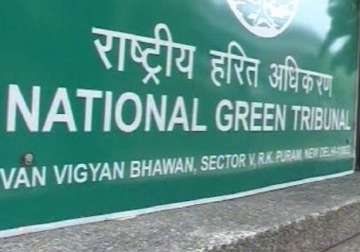Rs 5,000 fine for dumping waste into drains, says NGT
New Delhi: National Green Tribunal Friday restrained individuals, including the municipal corporation employees, from throwing or dumping any kind of waste into the drains in the national capital and ordered a fine of Rs 5,000
New Delhi: National Green Tribunal Friday restrained individuals, including the municipal corporation employees, from throwing or dumping any kind of waste into the drains in the national capital and ordered a fine of Rs 5,000 for violating these directions.
A bench, headed by NGT Chairperson Justice Swatanter Kumar, directed the municipal corporations of Delhi to clean all the drains of any municipal or other waste.
"The Corporations and all public authorities shall forthwith take action in accordance with law and ensure that no illegal, unauthorized washing, slaughtering or running of dairies is permitted on the banks of the drains.
"All the Corporations and authorities, including PWD, shall ensure that there is no encroachment on the drains or on its banks in any part of Delhi," the bench said.
Passing a slew of directions for effective and expeditious implementation of its order for restoration of Yamuna in the national capital, the Tribunal directed all Corporations and all public authorities to ensure that "no illegal or unauthorized washing, slaughtering or running of dairies is permitted on the banks of the drains".
"All the Corporations and authorities, including PWD, shall ensure that there is no encroachment on the drains or on its banks in any part of Delhi," it said.
The green panel asked Delhi Pollution Control Committee to ensure that all CETP's are operative to their optimum capacity and are capable of treating the industrial effluents that are brought to CETP's from their respective industrial clusters and submit a report in this regard within two months.
"Delhi State Industrial and Infrastructure Development Corporation Ltd (DSIDC) and other concerned authorities who are responsible for owning and/or maintenance of industrial clusters shall ensure that all member industry or non-member industries discharge their trade effluents only in the drain (conveyor belt leading to the CETP).
Accepting the first phase of the "Maily Se Nirmal Yamuna" Revitalization Plan, 2017 submitted by Delhi Jal Board, the Tribunal appreciated Additional Solicitor General Pinky Anand for her assistance in implementation of the orders of the bench.
The Tribunal directed DJB to ensure that all its existing Sewage Treatment Plants (STPs), particularly in relation to the drains covered under the first phase of the project, are made to operate efficiently and to their optimum capacity.
"It is stated that Najafgarh Drain (and its supplementary drain) along with Delhi Gate Drain, causes 63 per cent of Yamuna?s pollution. This should be taken as a priority project under Phase 1 within the framework of the judgment," it said.
The Tribunal agreed with the submissions of DJB that the restoration of Yamuna should be carried out in a phased manner which is likely to bring "effective and efficient results".
Advocates Balendu Shekhar and Pooja Kalra, appearing for municipal corporations, assured the Tribunal that the orders of the Tribunal would be implemented in its "true spirit and substance".
The five-judge bench asked DJB, along with DDA, Revenue Department or any other authority, to take possession of all the required land on which STPs are intended to be constructed, at the earliest and not later than four weeks.
"DDA has nearly 281 unauthorized colonies and 10.80 lakhs residential flats in various parts of Delhi, thus, heavily contributing to the generation of the sewage.
"We direct Ministry of Urban Development under Urban Development fund to require DDA to release funds. Delhi Jal Board and NCT, Delhi shall finance this project primarily.
The bench directed DJB and DSIDC to introduce an online "Monitoring System" particularly at the specified observation points or locations, where STPs and CETPs are located, and upload the same in the public domain informing the public at large about the performance of STPs.
It asked DJB to provide desludging vehicles which will collect sludge from the septic tanks in the colonies and take it to the nearest STP and directed that such vehicles shall be provided with GPS to ensure proper collection and transportation to the designated location.
"We further make it clear that the interim orders passed by the Tribunal shall continue and Delhi Jal Board would not carry on further work on existing projects or any new project, except with the specific permission of the Tribunal in that regard.
"We hereby direct all the authorities, Corporation, DDA, NDMC, DJB, state of Haryana, Uttar Pradesh, government of NCT Delhi, CGWA and all concerned Ministries of central government to ensure compliance of directions contained in this order," the bench said.
